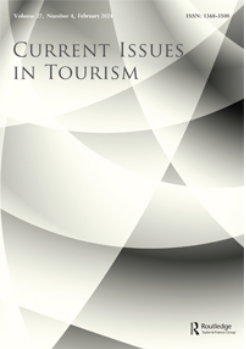Tourism and ecological restoration across borders: a political ecology approach
IF 4.6
3区 管理学
Q1 HOSPITALITY, LEISURE, SPORT & TOURISM
引用次数: 0
Abstract
ABSTRACTThis study uses political ecology and social and environmental justice frameworks to examine stakeholder attitudes towards tourism development and ecological restoration in a cross-border context. The purpose of this paper is to develop conceptual frameworks for understanding stakeholder attitudes towards cross-border tourism and ecological restoration that occur in the context of uneven power relations. Data were collected through personal observations, secondary sources such as legal documents and reports, and 56 in-depth interviews and two focus groups with tourism and conservation stakeholders from the US-Mexico border. The findings revealed how abundant social and environmental justice issues, such as unequal social and ecological mobility, access to resources, and power relations impact stakeholder attitudes. This study offers a new conceptual framework that considers socioeconomic, cultural, and religious/spiritual ties to a border landscape, aimed at understanding the injustices related to stakeholder in tourism development and ecological restoration initiatives. The equitable distribution of benefits derived from tourism and landscape restoration is further emphasized in the conceptual framework, as is the need for expanding social and ecological mobility. The paper contributes to the political ecology of cross-border tourism destinations by augmenting social and ecological mobility as a critical component of developing nature-based tourism in border areas.KEYWORDS: Tourism developmentecological restorationUS-Mexico borderpolitical ecologysocial and environmental justicestakeholdersinequity Disclosure statementNo potential conflict of interest was reported by the authors.Additional informationFundingThis work was supported by National Park Service [grant number: P21AC10112-00].跨境旅游与生态修复:一种政治生态学方法
摘要本研究运用政治生态学和社会与环境正义框架,考察了跨境背景下利益相关者对旅游发展和生态恢复的态度。本文的目的是建立概念框架,以理解在权力关系不平衡的背景下利益相关者对跨境旅游和生态恢复的态度。数据通过个人观察、法律文件和报告等二手来源、56次深度访谈和两次与美墨边境旅游和保护利益相关者的焦点小组收集。研究结果揭示了大量的社会和环境正义问题,如不平等的社会和生态流动性、资源获取和权力关系如何影响利益相关者的态度。这项研究提供了一个新的概念框架,考虑了社会经济、文化和宗教/精神与边境景观的联系,旨在理解旅游发展和生态恢复倡议中与利益相关者相关的不公正。在概念框架中进一步强调了公平分配旅游和景观恢复带来的利益,以及扩大社会和生态流动性的必要性。本文通过增加社会和生态流动性作为发展边境地区自然旅游的关键组成部分,为跨境旅游目的地的政治生态做出了贡献。关键词:旅游发展生态修复美墨边境政治生态社会与环境正义利益相关者公平披露声明作者未报告潜在利益冲突。本研究得到了国家公园管理局的支持[资助号:P21AC10112-00]。
本文章由计算机程序翻译,如有差异,请以英文原文为准。
求助全文
约1分钟内获得全文
求助全文
来源期刊

Current Issues in Tourism
HOSPITALITY, LEISURE, SPORT & TOURISM-
CiteScore
15.50
自引率
10.00%
发文量
230
期刊介绍:
Journal metrics are valuable for readers and authors in selecting a publication venue. However, it's crucial to understand that relying on any single metric provides only a partial perspective on a journal's quality and impact. Recognizing the limitations of each metric is essential, and they should never be considered in isolation. Instead, metrics should complement qualitative reviews, serving as a supportive tool rather than a replacement. This approach ensures a more comprehensive evaluation of a journal's overall quality and significance, as exemplified in Current Issues in Tourism.
 求助内容:
求助内容: 应助结果提醒方式:
应助结果提醒方式:


